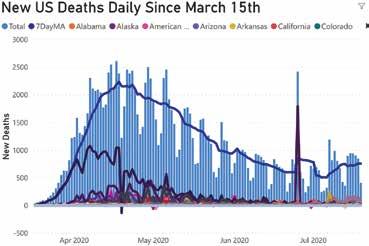
2 minute read
ASSESSING IMPACTS IN REAL TIME
UNCW researchers are exploring how the pandemic is affecting public health, communities, businesses and beyond.
By Tricia Vance
Advertisement
While the COVID-19 pandemic has created significant challenges in higher education, it has also created a wealth of opportunities. More than three dozen UNCW researchers have begun projects related to the disease since the outbreak began threatening the United States in early spring. These projects often involve interdisciplinary and even multi-institutional teams, and many include graduate students or post doctoral associates.
“UNCW faculty and staff in all four colleges are using their expertise to learn more about how the COVID-19 outbreak has affected our communities, schools, health care workers, businesses and our individual behaviors,” said Stuart Borrett, associate provost for research and innovation. One of the most watched aspects of the pandemic is where the coronavirus is spreading and the people it affects. UNCW data scientist and associate professor of mathematics and statistics Rachel Carroll is leading a team that has adapted publicly available COVID-19 data to visualize the outbreak in North Carolina and the state’s southeastern region.
The project also involves Mark Lammers (mathematics and statistics/data science), Dylan McNamara (physics and physical oceanography), postdoctoral researcher Zachary Williams and several M.S. Data Science students.
Carroll began looking into data related to the COVID-19 crisis in early March 2020.
Stuart Borrett, associate provost for research and innovation


- Stuart Borrett
“Understanding how the disease spreads has become vital in efforts to suppress it,” Carroll said. “Widely accessible data has furnished a unique opportunity to explore data visualizations and statistical methods in real time to make this analysis accessible to the general public.”
The pandemic has also been hard on small businesses, and environmental sciences assistant professor Huili Hao is collaborating on a study of COVID-19’s impact on small businesses, as well as how the businesses and their communities react to and cope with the challenges they face. The project is funded by a $53,196 National Science Foundation Rapid Response Research grant. Hao’s share of the grant is $19,143. Her research partner is primary investigator Qingfang Wang, a public policy professor at the University of CaliforniaRiverside, and their goal is to enhance knowledge about how to empower local businesses, increase diverse employment opportunities and enhance the adaptive capacity of private companies to contribute to broader community resilience.

Through these and other research efforts, UNCW faculty, staff and students are taking on meaningful roles in the global effort to understand the pandemic’s impact, mitigate issues when possible, and better prepare us all for the future.










